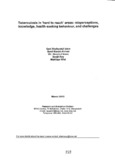| dc.contributor.author | Islam, Qazi Shafayetul | |
| dc.contributor.author | Ahmed, Syed Masud | |
| dc.contributor.author | Islam, Md. Akramul | |
| dc.contributor.author | Roy, Sanjit | |
| dc.contributor.author | Rifat, Mahfuza | |
| dc.date.accessioned | 2019-12-04T09:40:23Z | |
| dc.date.available | 2019-12-04T09:40:23Z | |
| dc.date.issued | 2013-03 | |
| dc.identifier.citation | lslam, Q. S., Ahmed, S. M., lslam, M. A., Roy, S., & Rifat, M. (2013, March). Knowledge and practice of formal physicians regarding control and prevention of TB in light of national guidelines. Research Reports (2013): Health Studies, Vol - XLV, 259–304. | en_US |
| dc.identifier.uri | http://hdl.handle.net/10361/13197 | |
| dc.description.abstract | This study was conducted to explore the knowledge and perceptions of health workers
and community people about tuberculosis in geographically inaccessible (hard-to-reach)
tuberculosis (TB) programme areas of BRAG. The study also explored the health seeking
behaviour of TB suspects (having cough >3weeks) and challenges faced by the
programme in this particular situation. This cross-sectional survey was conducted in 15
'hard-to-reach' upazilas (out of 30 such upazilas), and another 15 upazilas, adjacent to
the above upazilas and selected randomly for comparison. The study included 338
health workers (Shasthya Shebika or SS), 3,600 community people, 1,800 TB suspects
and 1,800 non-suspects. Two modules of questionnaires (structured and semistructured)
were developed for the health workers and the community people. The study
found that the misperception that TB is 'a disease of only male' was common among the
health workers (44%) and community people (46-57%). Further, many of them
misperceived the common ways of acquiring TB such as by sharing patients' utensils
(46-49%), smoking (80-87%), and that TB could be prevented by avoiding smoking (58-
63%). Almost half of the SSs (49%) could not recall at least four messages on TB that
they learned from training. Many of the SSs confessed that they were not involved (64%)
in delivering TB messages in the community, and a significant numbers of SS (41 %)
were not motivated to work in the TB control programme.
The community people lacked basic information on TB. Further, almost about half of the
community people ( 41-4 7%) were afraid of TB in both the study areas, and a majority of
community people (52-56%) reported that they wanted to stay away from the TB
patients. The study further found that one-third did not take any treatment for their illness
(median duration of illness being six weeks), and two-third did not undergo sputum test.
The main sources of treatment of TB suspects were village doctors (26-35%) and
attendants at drug shops (35-36%). The geographical distance, treatment noncompliance,
and lack of trust in SSs' management were identified as the major
constraints in hard-to-reach areas for implementing TB programme efficiently. The
implications of these in management of TB control programme are discussed and
recommendations are made. | en_US |
| dc.language.iso | en | en_US |
| dc.publisher | BRAC Research and Evaluation Division (RED) | en_US |
| dc.subject | TB | en_US |
| dc.subject | Health seeking behavior | en_US |
| dc.subject | Rural Bangladesh | en_US |
| dc.subject | BRAC | en_US |
| dc.subject.lcsh | Rural health--Bangladesh. | |
| dc.subject.lcsh | Tuberculosis--Prevention | |
| dc.subject.lcsh | Health, Nutrition, and Population Program (BRAC) | |
| dc.title | Tuberculosis in 'hard to reach' areas: misperceptions, knowledge, health-seeking behaviour, and challenges | en_US |
| dc.type | Research report | en_US |

